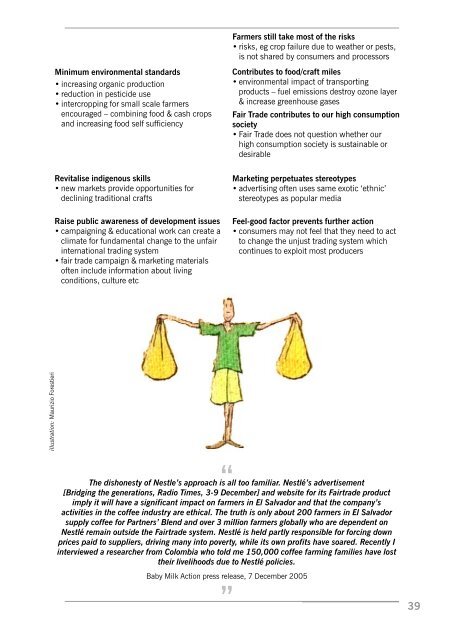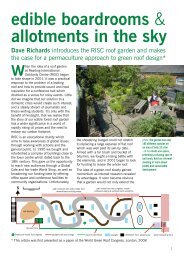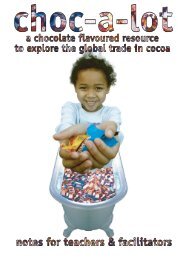Cost of coffee.indd - RISC
Cost of coffee.indd - RISC
Cost of coffee.indd - RISC
Create successful ePaper yourself
Turn your PDF publications into a flip-book with our unique Google optimized e-Paper software.
Farmers still take most <strong>of</strong> the risks<br />
• risks, eg crop failure due to weather or pests,<br />
is not shared by consumers and processors<br />
Minimum environmental standards<br />
• increasing organic production<br />
• reduction in pesticide use<br />
• intercropping for small scale farmers<br />
encouraged – combining food & cash crops<br />
and increasing food self sufficiency<br />
Contributes to food/craft miles<br />
• environmental impact <strong>of</strong> transporting<br />
products – fuel emissions destroy ozone layer<br />
& increase greenhouse gases<br />
Fair Trade contributes to our high consumption<br />
society<br />
• Fair Trade does not question whether our<br />
high consumption society is sustainable or<br />
desirable<br />
Revitalise indigenous skills<br />
• new markets provide opportunities for<br />
declining traditional crafts<br />
Raise public awareness <strong>of</strong> development issues<br />
• campaigning & educational work can create a<br />
climate for fundamental change to the unfair<br />
international trading system<br />
• fair trade campaign & marketing materials<br />
<strong>of</strong>ten include information about living<br />
conditions, culture etc<br />
Marketing perpetuates stereotypes<br />
• advertising <strong>of</strong>ten uses same exotic ‘ethnic’<br />
stereotypes as popular media<br />
Feel-good factor prevents further action<br />
• consumers may not feel that they need to act<br />
to change the unjust trading system which<br />
continues to exploit most producers<br />
illustration: Maurizio Forestieri<br />
“<br />
The dishonesty <strong>of</strong> Nestle’s approach is all too familiar. Nestlé’s advertisement<br />
[Bridging the generations, Radio Times, 3-9 December] and website for its Fairtrade product<br />
imply it will have a significant impact on farmers in El Salvador and that the company’s<br />
activities in the c<strong>of</strong>fee industry are ethical. The truth is only about 200 farmers in El Salvador<br />
supply c<strong>of</strong>fee for Partners’ Blend and over 3 million farmers globally who are dependent on<br />
Nestlé remain outside the Fairtrade system. Nestlé is held partly responsible for forcing down<br />
prices paid to suppliers, driving many into poverty, while its own pr<strong>of</strong>its have soared. Recently I<br />
interviewed a researcher from Colombia who told me 150,000 c<strong>of</strong>fee farming families have lost<br />
their livelihoods due to Nestlé policies.<br />
Baby Milk Action press release, 7 December 2005<br />
”<br />
39




